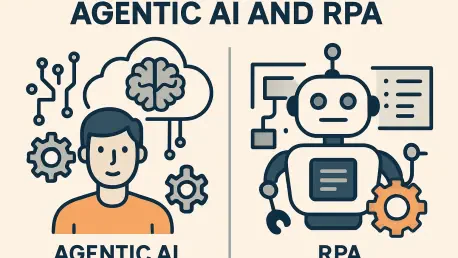In the rapidly evolving world of accounting, the integration of advanced technologies is no longer a futuristic vision but a current necessity. As accounting professionals seek ways to enhance efficiency and service delivery, automation technologies such as Agentic AI and Robotic Process Automation (RPA) have emerged as pivotal tools. With distinct characteristics and applications, understanding the nuances between these two technologies is crucial for optimizing accounting workflows and staying competitive.
Introduction to Agentic AI and Robotic Process Automation
Automation technologies have transformed various industries, and accounting is no exception. With increasing demands for accuracy and speed, firms are turning to technologies that not only simplify their processes but also provide strategic advantages. Agentic AI and RPA serve different purposes within modern workflows. While Agentic AI offers advanced autonomous capabilities, RPA focuses on streamlining repetitive tasks. As technological advancements continue to surge, both Agentic AI and RPA are positioned as essential components of contemporary automation solutions.
Comparative Features and Functionalities
Autonomy and Adaptability
Agentic AI stands out for its high degree of autonomy and ability to learn and adapt to new environments. By utilizing generative AI and large language models (LLMs), it can operate with minimal human intervention, adjusting to changes and improving outputs over time. In contrast, RPA is less autonomous, following strict rules and requiring regular updates to function effectively. It excels in environments where tasks are predictable and do not require adaptability. For instance, while Agentic AI might be used to monitor and respond to shifts in regulatory landscapes, RPA efficiently automates standard bookkeeping or payroll tasks.
Efficiency and Task Automation
When it comes to efficiency, both Agentic AI and RPA offer distinct approaches. Agentic AI automates tasks by interpreting and analyzing real-time data for strategic decision-making. This makes it suitable for complex tasks like audit reporting or tax planning. By contrast, RPA automates repetitive tasks based on pre-set instructions, offering incredible speed and accuracy for processes such as invoicing. While each has proven efficient in its domain, the choice between them often hinges on the complexity and nature of the task at hand.
Complexity and Cognitive Abilities
Agentic AI’s ability to process complex information and simulate cognitive functions is a significant advantage, allowing it to handle intricate tasks such as project management or client communications. It excels in environments that require decision-making based on complex datasets. RPA is designed for rule-based, repetitive processes, thriving in settings where tasks are stable and consistent. The fundamental difference lies in Agentic AI’s potential to learn and make decisions versus RPA’s strength in executing predefined processes.
Challenges and Considerations
Despite their benefits, both Agentic AI and RPA present challenges that must be considered before implementation. Agentic AI raises ethical and technical questions, including concerns about data security and the need for robust oversight to prevent misuse or errors. RPA, while effective, is limited by its rigidity, potentially requiring frequent updates as business processes evolve. Both technologies also face issues related to scalability and integration into existing workflows, necessitating careful planning and strategy.
Conclusion and Recommendations
In summary, Agentic AI and RPA represent two distinct paths in the automation landscape, each with unique strengths and applications to offer accounting firms. While Agentic AI introduces flexibility and learning capabilities suited for complex scenarios, RPA remains a dependable choice for streamlining repetitive tasks. For firms looking to adopt automation, the decision depends on specific organizational goals and tasks.
Moving forward, accountants should consider how these technologies can complement one another within their workflows. Leveraging the adaptive nature of Agentic AI alongside the reliability of RPA ensures a balanced approach to automation. As firms continue to integrate these solutions, staying informed about advancements and best practices is crucial. By effectively navigating this evolving landscape, accounting professionals can achieve greater efficiencies and service enhancements in an increasingly digital world.









